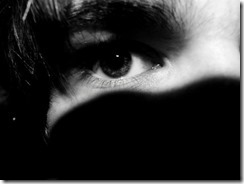Prelude
"I don't have to do this," she said,
as she was led into the room,
in an almost spoiled voice –
implying concession –
but she was not corrected.
As there was no screen
behind which to undress
she asked for the lights to be doused
and hid in the long shadows.
6 November 1982
I find this a very uncomfortable read and it’s one of several poems written about this time I’m not sure I could write now or would want to write. I remember Ian McEwan saying much the same about his early short stories. Like ‘Old Walt’ (#514) it leaves  everything to the readers’ imaginations. It’s about dignity. A woman who has clearly lost control of her life is still trying to hang onto something.
everything to the readers’ imaginations. It’s about dignity. A woman who has clearly lost control of her life is still trying to hang onto something.
Beckett once recalled an occasion when Sir Ralph Richardson “wanted the low-down on Pozzo, his home address and curriculum vitae, and seemed to make the forthcoming of this and similar information the condition of his condescending to illustrate the part of Vladimir ... I told him that all I knew about Pozzo was in the text, that if I had known more I would have put it in the text, and that was true also of the other characters.” I mention this because this is also true here. I have no idea who the woman or girl is, where she is, why she’s there or what’s going to happen to her although I suspect it’s going to be unpleasant. I’m sure this admission will sound odd to non-writers (and many writers who create lengthy backstories that never end up in their novels) but I’ve never needed that. I think this is because I know my characters are cyphers. They’re not real. No female got hurt or demeaned in the writing of this poem.